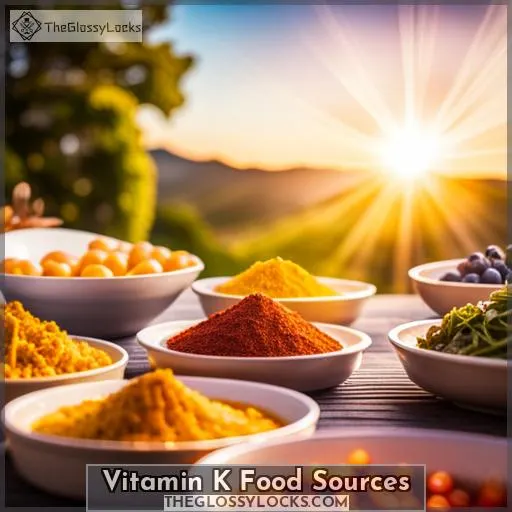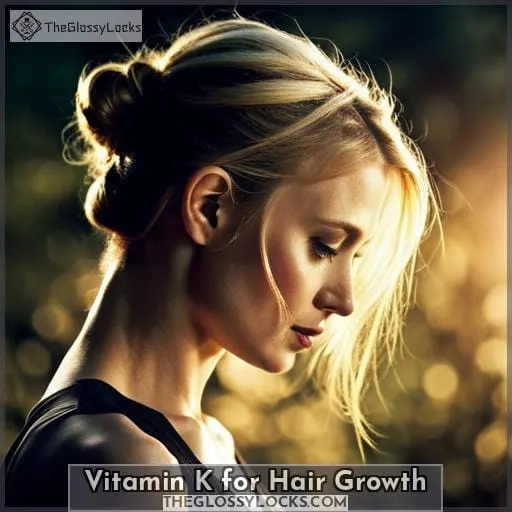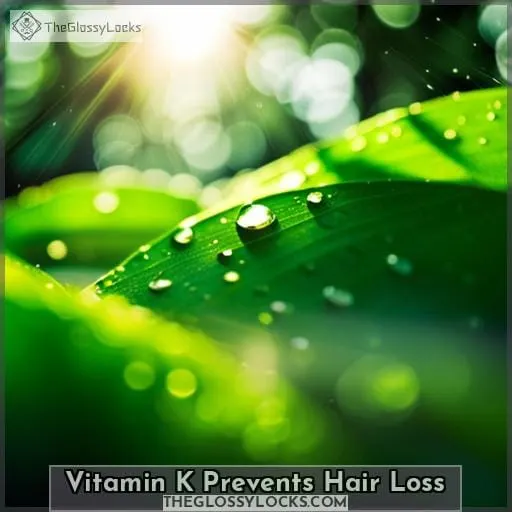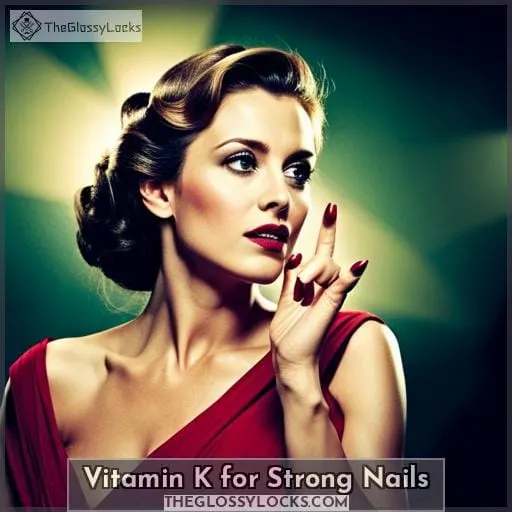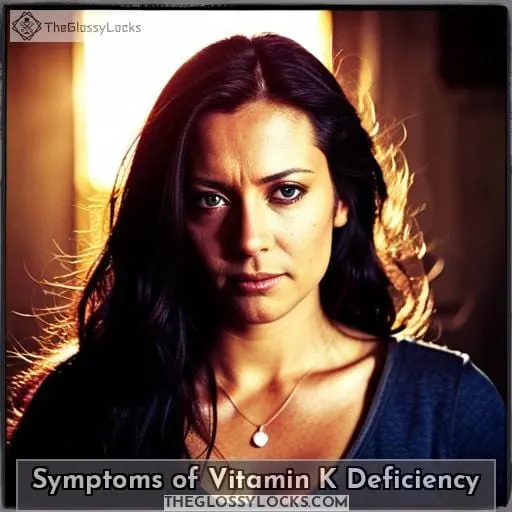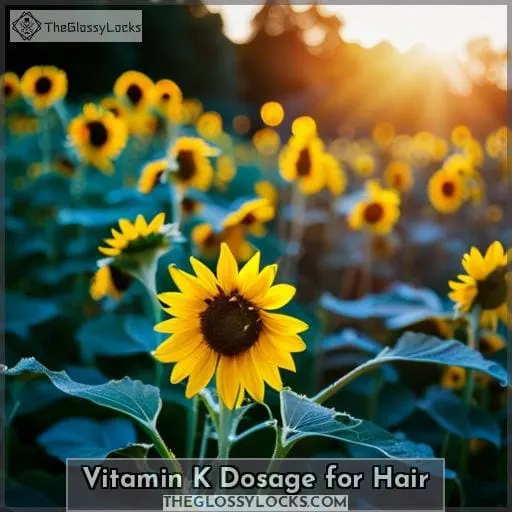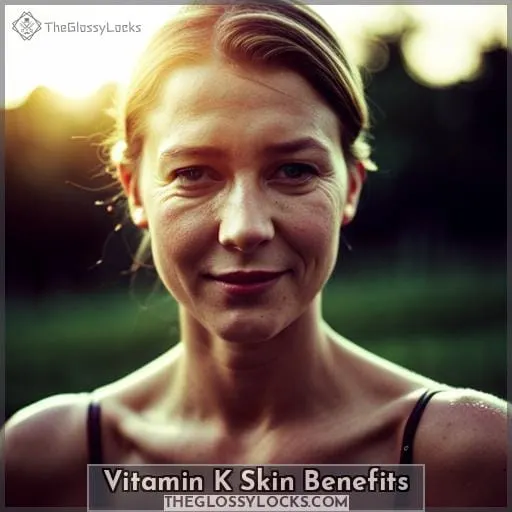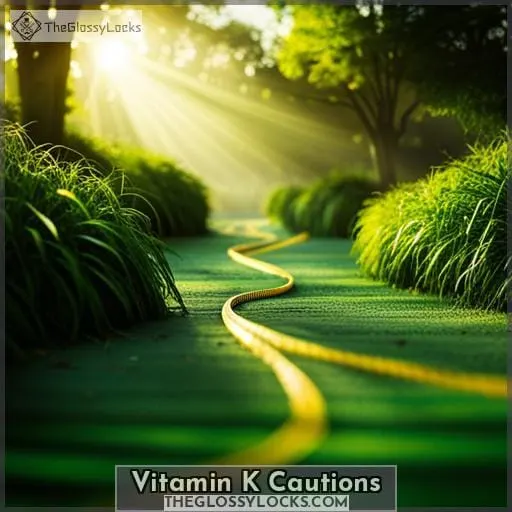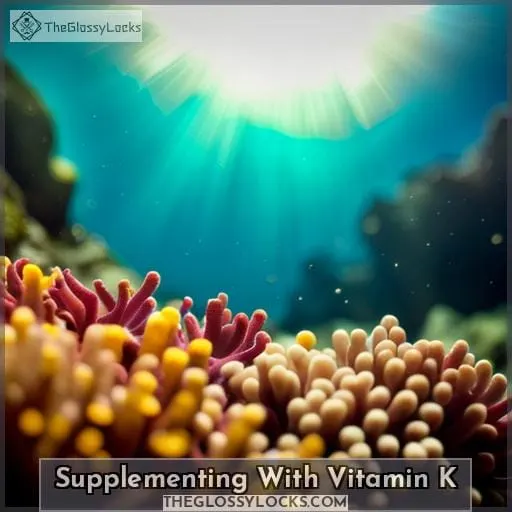This site is supported by our readers. We may earn a commission, at no cost to you, if you purchase through links.
 You’re staring in the mirror, utterly despondent as clumps of hair clog the shower drain. Despite trying every remedy, your luxurious locks continue thinning while your self-esteem plummets.
You’re staring in the mirror, utterly despondent as clumps of hair clog the shower drain. Despite trying every remedy, your luxurious locks continue thinning while your self-esteem plummets.
Vitamin K unveils untapped potential that could reduce hair loss, strengthen nails, and reveal the luminous, fuller mane you crave.
Though vitamin K benefits multiple body systems, new research highlights surprising effects on hair and nails. Optimizing intake may activate growth factors to minimize shedding and stimulate regrowth, returning your hair to its former glory.
Don’t lose hope. A simple dietary addition could restore thickness and shine.
Discover how vitamin K transforms hair from lackluster to lustrous.
Table Of Contents
Key Takeaways
- Vitamin K plays an important role in hair growth and strength by activating proteins involved in collagen production.
- Consuming adequate vitamin K from dietary sources such as leafy greens, eggs, and meat promotes strong, healthy hair.
- Vitamin K deficiency may contribute to hair loss and weak nails. Supplements could help address deficiencies.
- Applying vitamin K topically shows promise for stimulating hair growth, although more research is needed in this area.
What is Vitamin K?
Vitamin K is an essential vitamin critical for many body functions like blood clotting, calcium regulation, and heart health. Leafy greens, eggs, meats, and cheeses provide the nutrient. While the recommended daily intake varies, high doses may pose uncertain safety risks.
Vitamin K aids hair regrowth and prevents loss by nourishing follicles. It may naturally reverse thinning by stimulating growth factors and proteins that support thicker strands. Though more research is needed, incorporating vitamin K-rich foods or supplements into your routine could boost shine, volume, and density for lush locks.
You’ve heard how important vitamin K is for blood clotting and bone health, but did you know it can also promote thicker, fuller hair? A deficiency is rare in adults yet common in newborns.
Discuss with your doctor if vitamin K could be right for your hair goals.
Vitamin K Food Sources
Eating veggies like spinach and kale gives you plenty of the vitamin that strengthens your locks. Dark leafy greens such as spinach, kale, broccoli and Brussels sprouts are excellent sources of vitamin K.
Just one cup of raw spinach knocks out over half of your daily vitamin K needs. Soybeans, strawberries and avocados also provide a healthy dose. Getting enough vitamin K from your diet ensures your hair follicles remain strong and your strands keep growing back robustly after shedding.
The unique benefits this underappreciated vitamin offers for reviving thinning hair and stimulating regrowth make it a bonafide mane booster. Consistently meeting your daily vitamin K needs through food provides the nourishment essential for optimal hair health and regrowth.
Vitamin K for Hair Growth
Got thin hair? Up your vitamin K intake for thicker, fuller locks in no time. Vitamin K is essential for healthy hair growth. It nourishes hair follicles, strengthens strands, and prevents hair loss. This vitamin activates proteins that give hair its strength and shine.
Natural dietary sources are best for reaping vitamin K benefits. Leafy greens like kale, spinach, and broccoli pack high levels. Strawberries, avocados, eggs, and fermented foods like natto also supply this hair-healthy nutrient.
For optimal impact, combine vitamin K with other vitamins and nutrients involved in hair growth like biotin, vitamin C, zinc, and iron. With the right dietary balance, vitamin K can help you achieve naturally thicker, voluminous hair.
You’ll want to consume vitamin K regularly as part of a balanced diet. Pair vitamin K-rich foods with healthy fats to maximize absorption. Consider taking a supplement too. But be sure to check with your doctor first, especially if you take blood thinners.
With some smart dietary strategies, vitamin K may give you the luscious locks you’ve been dreaming of.
Vitamin K Prevents Hair Loss
It keeps your mane full and healthy-lookin’. Vitamin K prevents hair loss and encourages regrowth by providin’ nutritional support to your follicles. Signs of deficiency include thin, brittle strands. Excellent dietary sources include leafy greens, broccoli, liver, and strawberries.
While topical vitamin K shows promise for boostin’ growth, more research is needed.
To maximize hair benefits:
- Eat plenty of vitamin K-rich foods
- Consider a supplement if deficient
- Massage oil with vitamin K into scalp
- Identify and address other causes of hair loss
- Talk to your doctor about prescription options
Maintainin’ adequate vitamin K intake helps retain your lush locks and prevent thinnin’. Support your hair from the inside out by gettin’ enough of this essential vitamin.
Vitamin K for Strong Nails
You’ll see beautifully strong nails after getting enough vitamin K in your diet. Vitamin K plays an important role in nail health and strength, as it activates proteins involved in collagen production, which makes up the nail matrix.
With adequate vitamin K, your body produces strong, durable nails that resist chipping and breakage. Be sure to eat plenty of vitamin K-rich foods like leafy greens, broccoli, and strawberries. Supplements are another option if your diet is lacking in this vitamin. Strong, healthy nails reflect overall wellness.
Focus on consuming enough vitamin K through dietary sources and supplementation for optimal nail health.
Symptoms of Vitamin K Deficiency
- Easy bruising
- Frequent nosebleeds
- Bleeding gums
Without enough vitamin K, you’ll bleed more easily and bruise more often. Prolonged deficiency can weaken bones, leading to osteoporosis or osteopenia. Vitamin K’s essential for bone mineralization and production of osteocalcin, a protein involved in bone formation.
When vitamin K levels are low, your blood takes longer to clot, and you may experience increased bleeding. This includes bruising with minor bumps or injuries, frequent nosebleeds, or bleeding gums.
Getting enough vitamin K from your diet or supplements can help maintain blood clotting and healthy bones.
Vitamin K Dosage for Hair
Since optimal dosing remains unclear, add spinach salads and broccoli stir-fries to your diet to nourish those luscious locks fluttering across your shoulders. While vitamin K shows promise for lush hair growth, research on the optimal dosage is limited.
Aim to meet the recommended dietary allowance through food sources like leafy greens, beans, oils, and fermented foods.
Supplements aren’t necessary for most healthy adults already meeting their vitamin K needs. More isn’t necessarily better – high doses may have uncertain safety. As with any supplement, consult your healthcare provider before use, especially if you take blood thinners.
Nourish your hair from within by filling your plate with vitamin K-rich fruits, vegetables, cheeses, and fermented options. A balanced diet supports both your locks and overall health. Luscious, flowing hair awaits with patience and a commitment to healthy eating.
| Recommended Daily Intake | Potential Supplemental Dosage |
|---|---|
| 90-120 mcg for adult women | Up to 120 mcg |
| 120 mcg for adult men | |
| 30-55 mcg for children |
Vitamin K Skin Benefits
In addition to aiding hair regrowth and preventing hair loss, vitamin K can strengthen nails. This essential vitamin provides key nutrients that support keratin production in hair and nails, leading to improved growth and strength.
Hair Regrowth Potential
Nourishing your locks from root to tip, the magic molecule can revive your mane’s lush fullness. Vitamin K may spur hair regrowth through its nutrient synergy, antioxidant properties, and ability to reduce inflammation.
Making savvy dietary choices and adopting hair-healthy lifestyle factors can maximize vitamin K’s potential for hair regrowth. Focus on fortifying your follicles holistically, not just correcting a vitamin K deficiency.
Treat your tresses with care and patience as you coax renewed vigor from within.
– Prevents Hair Loss
You’ll notice less hair in your brush and shower drain when getting enough vitamin K.
- Promoting hair follicle health
- Improving scalp circulation
- Regulating hormonal factors
Incorporating vitamin K-rich foods like leafy greens, eggs, and liver can support hair retention. Using vitamin K skin care products may also prevent hair shedding and thinning. With its nutritional and topical benefits, vitamin K is a key component of hair care and health.
– Strengthens Nails
Get nails strong as steel, soak ’em in greens daily. Power up nail health with vitamin K-rich foods. This essential nutrient strengthens nails by improving calcium absorption for hard, crack-resistant nails.
Load up on vitamin K daily to get nails as strong as steel beams. Kale, spinach, broccoli, strawberries and soybeans pack a nail-strengthening punch.
| Food | Vitamin K (mcg per serving) | % DV* |
|---|---|---|
| Kale (1 cup chopped) | 547 mcg | 684% |
| Spinach (1 cup) | 145 mcg | 181% |
| Broccoli (1 cup) | 220 mcg | 275% |
*Percent Daily Value based on 90 mcg RDI for adult women
Vitamin K delivers a one-two punch by aiding calcium absorption for strong bones and nails resistant to cracks and splits.
Vitamin K Cautions
High doses of vitamin K could be risky if you’re on blood thinners or certain meds. While generally safe at recommended levels, vitamin K can interact with common drugs like blood thinners, antibiotics, and seizure meds.
Large doses may reduce the effectiveness of blood thinners like warfarin, increasing your risk of blood clots. Megadoses of over 100 times the recommended amount could potentially lead to vitamin K toxicity.
Symptoms might include jaundice, anemia, kidney or liver damage. To stay safe, stick to the recommended intake and check with your doctor before taking supplements, especially if you’re on meds.
While vitamin K has health benefits, more isn’t necessarily better. Moderation and caution are key.
Supplementing With Vitamin K
Though supplementing with vitamin K may aid hair growth, proceed with caution since the safety of high doses is uncertain. Vitamin K supplementation may help support healthy hair regrowth and nail strength when taken as recommended.
However, high doses may have side effects, so follow dosage guidelines carefully. While vitamin K is abundant in leafy greens, eggs, meats and cheeses, those with digestive issues or taking blood thinners may become deficient and benefit from supplementation.
For healthy people, focusing on vitamin K-rich foods may be better than supplements to meet needs.
When supplementing, 100-120 mcg daily is typically enough for adults. Those on blood thinners should supplement only under medical supervision due to interactions. Look out for side effects like easy bleeding. With careful use, vitamin K supplements may support hair regrowth and strong nails.
Conclusion
With all that vitamin K can nurture in your life, you could say it’s like a green thumb helping you grow. Regularly tending to your vitamin K intake through food sources and other benefits can foster strong, healthy hair growth while preventing loss.
Making room for vitamin K in your diet will allow your hair to thrive. By consuming vitamin K regularly, you may experience lush, robust hair growth. This essential vitamin promotes strong strands by delivering nutrients to the hair follicles and scalp.
It also helps prevent hair loss and thinning caused by a vitamin K deficiency. Including vitamin K-rich foods like leafy greens, beans, eggs, and fermented dairy can ensure your mane gets the vitamins it needs.
Pairing a wholesome diet with other hair-healthy habits will allow your locks to flourish.


